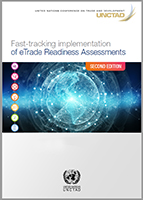
Since 2017, UNCTAD’s eTrade Readiness Assessments (eT Readies) are providing capacity building support in developing countries, particularly least developed countries (LDCs). eT Readies are demand-driven and provide a thorough overview of the current e-commerce ecosystem in the countries concerned and recommend conducive measures in seven policy areas through a comprehensive action matrix.
But the assessments are only the beginning. Their real value comes to fruition when moving from policy recommendations to implementation. That is why UNCTAD set up the eT Ready Implementation Support Mechanism (ISM) in 2020. Through the ISM, implementation reviews are regularly conducted, to build in-country capacities for effective implementation, based on the principles of country ownership, inclusivity, and results-based management. The Implementation Review done in 2020 was the first of its kind and allowed to capture the progress made by 13 eT Ready beneficiary countries.
This report, “Fast-tracking implementation of eTrade Readiness Assessments – Second edition” is the second to review the implementation of the recommendations contained in the assessments. It has highlighted 140 new achievements from 14 countries, featuring an average implementation rate of 59 per cent, a nine per cent gain compared to the first review.
The review has confirmed Cambodia as the top-performer country with an implementation rate of 92 per cent, followed by Bhutan, Senegal and Togo all standing at 81 per cent. Experience from the top-performers has stressed how strong political leadership at the Government level, exercised by a championing ministry, has helped to ensure stakeholder mobilization, all key to fast-track implementation. The report documents many good practices, policy impacts and lessons learned that can inspire countries and pave the way for further support.
Despite progress and valuable support provided by eTrade for all partners, this second Implementation Review highlights areas for improvement. It points to the need to strengthen national implementation arrangements, streamline policy coordination mechanisms and enhance synergies among development partners’ interventions.
The report stresses once more the urgency to accelerate e-commerce enabling reforms and investments to help foster economic recovery from the pandemic and increase the resilience to cope with new shocks. Its recommendations provide a solid basis to foster UNCTAD’s role in mobilizing the much-needed support to advance the e-commerce development agenda in eT Ready beneficiary countries, and accelerate digital transformation in developing countries, particularly LDCs, in line with the 2030 Agenda for Sustainable Development.




